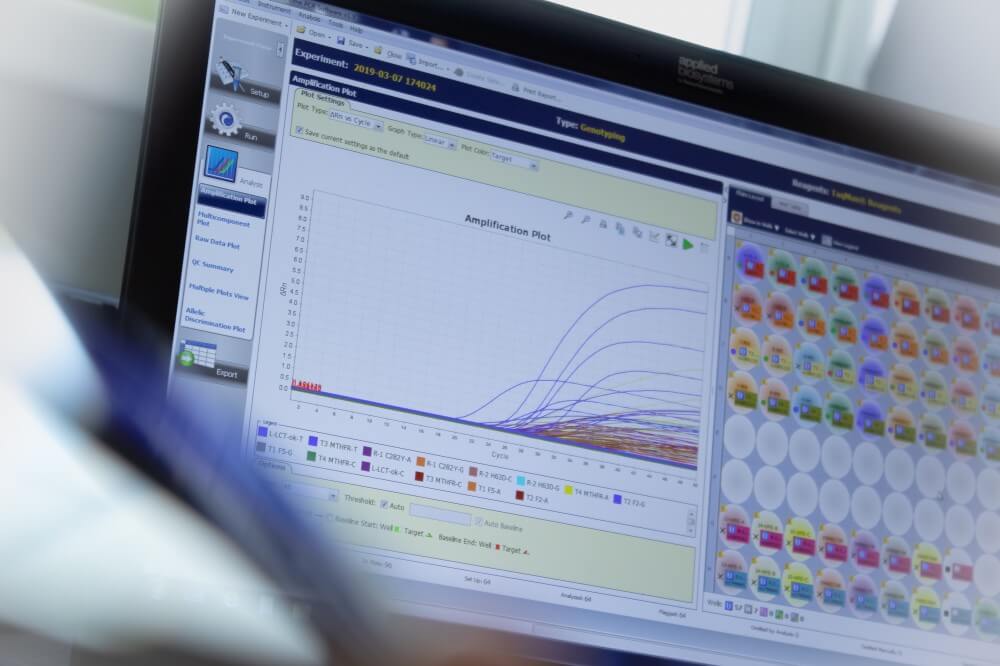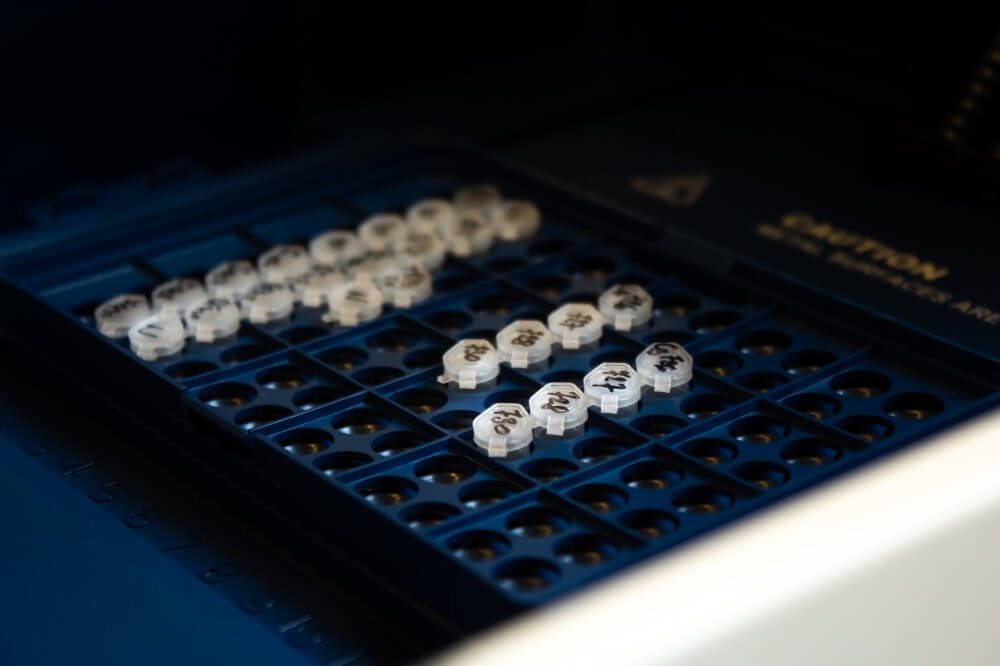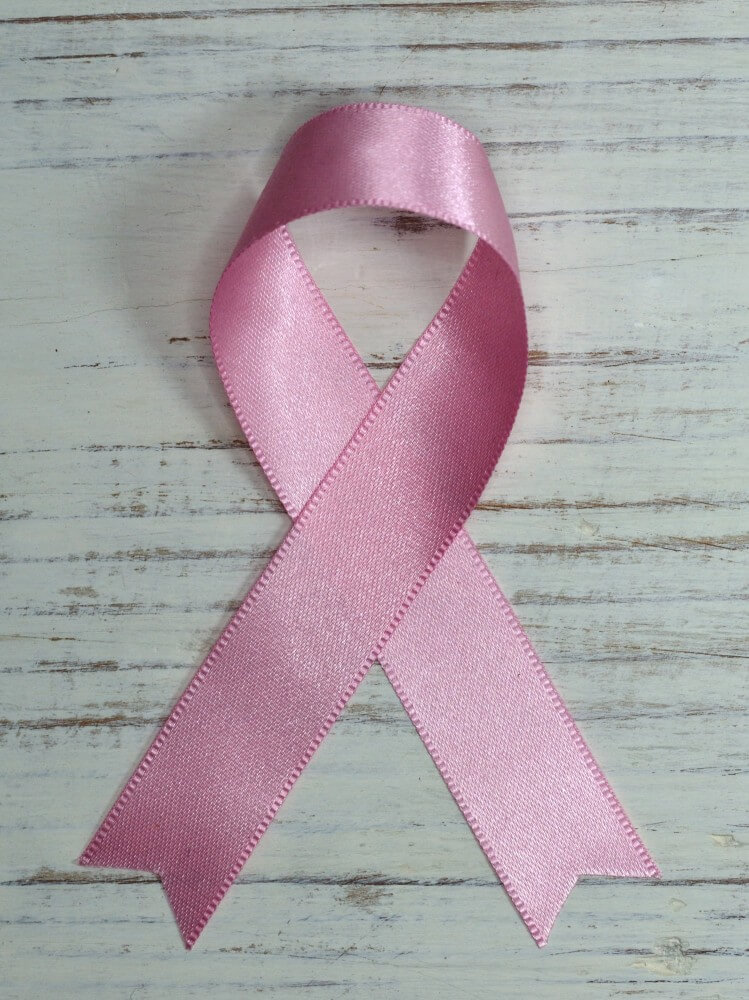Breast and ovarian cancer
Attention! Changes due to the COVID-19 pandemic!
The laboratory accepts clients and patients in person strictly by prior appointment. To apply for a visit, write to info@genera.lv or call us 26267833! We recommend that you perform the DNA test remotely. More information here.
BRCA1 and BRCA2 gene testing for inherited breast and ovarian cancer
For your information! At GenEra, we offer to identify the four most common mutations in the BRCA1 gene; if necessary, we can also organize full testing of the BRCA1 and BRCA2 genes.
If since 2013 you have had the most common BRCA1 mutation test at our laboratory, we will offer you the extended test with a 10% discount.

What are BRCA1 and BRCA2 genes?
The name is an abbreviation: BReast CAncer. These are genes associated with the risk of developing breast and ovarian cancer. If a woman has a mutation in one of these two genes, she has an increased risk of developing breast or ovarian cancer in her lifetime. The risk is high: 40–60% of women who carry mutations in these genes develop breast and/or ovarian cancer during their lifetime.
These are not the only genes that create a risk for breast and ovarian cancer, however, mutations in these genes are most common in patients with inherited breast and/or ovarian cancer.
Why should I test for mutations in the BRCA1 and BRCA2 genes?
Genetic testing allows understanding if the history of tumours in the family is related to an inherited variation. If you or your doctor suspects inherited cancer in your family, your doctor will choose the best possible tactic for your treatment (if you have already been diagnosed) or supervision to increase the chance of diagnosing cancer early.
Who could carry the BRCA1 and BRCA2 gene mutations? What events in the family indicate inherited cancer?
In 2017, newly diagnosed breast cancer in women was the 1st, and ovarian cancer, the 8th, most common oncological disease diagnosed*. 5–10% of breast cancers and 10% of ovarian cancers are associated with inherited mutations in cancer genes.
You may have a mutation in the BRCA1 or BRCA2 genes if:
You got breast or ovarian cancer at an early age (before the age of 50)**;
Your mother, sister, or daughter got breast cancer at an early age or ovarian cancer at any age;
A woman, your relative (also on your father’s side!) has had breast and ovarian cancer;
A woman, your relative (also on your father’s side!) has had bilateral breast cancer;
Your family is of Ashkenazi Jewish descent;
A man, who is your blood relative, has had breast cancer***;
You are a man and you have breast cancer.
However, it should be emphasized that BRCA1 and BRCA2 mutations have been detected in Latvian patients even without the above factors. So the presence of BRCA1 and BRCA2 mutations cannot be ruled out based on family history alone (it should also be noted that family history is often unknown). We would also like to add that if mutations are found, this does not confirm the diagnosis. People with mutations do not always develop breast and ovarian cancer during their lifetime. If the increased risk is known, it is easier to avoid the disease by taking preventive measures.

Pedigree mutation test
For almost 20 years, GenEra offers testing the most common mutations in Latvia — the so-called “pedigree” mutations in the BRCA1 gene. These mutations are the most common in patients with inherited breast and ovarian cancer in Latvia. A statistical study of our laboratory tests performed over the last six years, showed pathogenic pedigree mutations in 11–12% of cases.
If you have been tested for any of pedigree mutations, and none of them has been detected, but you and your family history meet to the above conditions for carrying the mutation, or you just want to be tested, we recommend that you consult your doctor and perform an expanded analysis, if necessary.
Why don't we test for the most common mutations in the BRCA2 gene?
Because, in our opinion, the prevalence of BRCA2 gene mutations in the Latvian population has not been extensively studied, and currently there is insufficient information to isolate the most common BRCA2 gene mutations in Latvia (Once such information is obtained). Once such information is obtained, we will offer to identify the most common mutations of the BRCA2 gene.
Is the presence of mutations possible without positive family history and disease?
YES!
Firstly, although the risk is very high, not all mutation carriers become ill. Whether the carrier of the mutation develops the disease depends on other factors, the environment, health, pregnancy and lactation for women, as well as many other unknown factors. Men who carry BRCA1 and BRCA2 mutations become ill very rarely (in 2017, breast cancer was detected in 10 men in Latvia***), but they can pass the mutations on to their sons and daughters.
Secondly, BRCA1 and BRCA2 mutations have been detected in Latvian breast and ovarian cancer patients even without the above factors. Therefore, the presence of BRCA1 and BRCA2 mutations cannot be ruled out based on family history alone.

Please note!
This test and learning your mutation carrying status may cause emotional and physical consequences, and we recommend that you consult your doctor before testing for BRCA1 and BRCA2 mutations.
Testing specifics
A sample of buccal mucosa (saliva sample) is needed to test for pedigree mutations. You and your doctor will be notified of the result of the pedigree mutation test within 10 working days. We will need a peripheral blood sample to analyse the coding region of the BRCA1 and BRCA2 genes. Analysis of the coding region of the BRCA1 and BRCA2 genes can take up to several weeks (depending on how long it takes for the chosen laboratory to do the testing).
Although this test is extensive, complex, and reveals most of the mutations in the coding region of the BRCA1 and BRCA2 genes, there are types of mutations that cannot be detected by this method either, so a negative result does not mean that no cancer has been inherited. The cause may lie in other genes, and a deeper analysis of the genes involved in the development of breast and ovarian cancer is needed.

This test is not the same as the test for somatic mutations in a tumour. Tests for hereditary cancer and tumour somatic mutations are technologically different, each with its own indications and limitations. Inherited cancer mutations are mutations that we receive from our parents and pass on to our children, while somatic mutations are those that occur in the tumour itself and are not passed on to any offspring.
IF YOU THINK YOU MIGHT NEED SUCH A TEST, CONTACT YOUR FAMILY DOCTOR, ONCOLOGIST, GYNAECOLOGIST, OR MAMMOLOGIST.
*SPKC data on registered women, broken down by tumour localization and age group, source: spkc.gov.lv
**In 2017, 207 women with breast cancer and 52 women with ovarian cancer under 50 years of age were included in the oncology register, source: spkc.gov.lv
***In 2017, 10 men with breast cancer were included in the oncology register, source: spkc.gov.lv
Important!
With a doctor’s referral (for a complete list, see the “Prices”) section) medical DNA tests (except for the prenatal NIPT “Panorama” test for pregnant women) are paid for by the NHS. Important! The NHS only pays for the test if the referral is issued as part of an NHS-paid visit, and the doctor has a contract with the NHS. Referrals issued during a paid visit will not be valid. Quotas are available.
The sample for DNA testing can be submitted at any branch of our partner - Centrālajā laboratorijā.
You can also order all offered DNA tests at full price. Remote contactless testing is available for both paid and NHS-referred tests. All medical DNA tests can be performed remotely, except for tests on pregnant women, where a blood sample must be collected.
Do you have questions about testing opportunities?
Ask us!